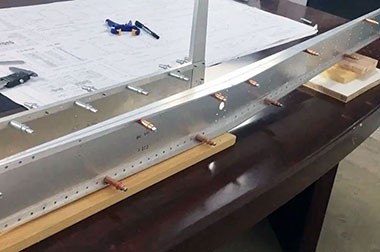7475-T61 Aluminum
7475-T61 aluminum alloy is a high-strength alloy that is widely used in aerospace and other fields that require high material performance. Its treatment in the T61 condition, which involves solution heat treatment and artificial aging, imparts high strength and good durability, but there are certain limitations in terms of formability and machinability.
- Alloy grade: 7475
- Condition: T61 (formed through solution heat treatment and artificial aging)
- Form: Can be in aluminum clad sheet or bare sheet form
- Typical applications: Aerospace structural components, petroleum refinery equipment, nuclear power plant boilers, and other high-strength required parts.
7475 T61 Aluminum Performance Characteristics
- Strength: 7475-T61 aluminum alloy has very high strength, making it suitable for applications that require extreme tensile strength, especially in the aerospace industry. Compared to other aluminum alloys, it has excellent strength-to-weight ratio.
- Machinability: Although it performs excellently in terms of strength, it has poor machinability. Machining 7475-T61 aluminum alloy requires high-end equipment and technology, and it is generally difficult to perform complex machining operations.
- Weldability: Due to its high strength characteristics, 7475-T61 has poor weldability. High-strength aluminum alloys are generally not suitable for traditional welding methods. Welding can negatively impact its mechanical properties, leading to cracks or reduced strength.
- Formability: This aluminum alloy has poor formability. During the forming of complex shapes, undesirable results may occur, and higher temperatures are required for processing. However, even under these conditions, the forming results are not as good as those of lower-strength aluminum alloys.
- Corrosion resistance: Compared to other aluminum alloys, 7475-T61 has average corrosion resistance. Although it can be improved through aluminum cladding, the bare sheet does not offer the same corrosion resistance as alloys like 7075 or 7050. In particularly corrosive environments, such as marine or chemical exposure, additional protective measures may be required.
- Heat treatment: 7475-T61 aluminum alloy has good heat treatment properties. Through solution heat treatment and artificial aging processes, it can achieve the desired mechanical properties. This type of aluminum alloy is typically used in applications that require high strength but are not exposed to high temperatures.
7475 T61 Aluminum Applications
7475-T61 aluminum alloy is widely used in several high-demand fields, particularly where high strength and durability are required.
- Aerospace: In the aerospace industry, 7475-T61 aluminum alloy is commonly used in aircraft structural components, including fuselage frames, wings, and other parts, particularly in applications that require lightweight, high-strength materials. It provides essential performance advantages for aerospace vehicles.
- Oil and Gas Industry: Due to its excellent mechanical properties, 7475-T61 aluminum alloy is used in high-pressure equipment and boilers in petroleum refineries. These equipment operate in high-temperature, high-pressure environments and require materials with high strength and some corrosion resistance. Although its corrosion resistance is average, it can be improved through aluminum cladding.
- Nuclear Industry: 7475-T61 aluminum alloy is also used in nuclear power plants, particularly in some structural components and boilers that store high-pressure fluids. Despite its corrosion issues, its strength and durability make it an ideal choice for certain nuclear applications.
- Ammunition Production: 7475-T61 aluminum alloy, due to its high-strength properties, is also used in the manufacture of high-performance bullet casings, providing the required strength and reliability.
7475-T61 aluminum alloy is an aluminum alloy with excellent strength, durability, and good heat treatment properties. It is widely used in aerospace, petroleum refining, nuclear power, and other industries that demand high material performance. However, its machinability, weldability, and corrosion resistance are relatively poor, so additional processing measures (such as aluminum cladding) are often needed to enhance its applicability. When choosing 7475-T61, engineers need to balance strength with the difficulty of processing to ensure its effectiveness in practical applications.
7475 T761 Aluminum Sheet Supplied Forms
7475 T61 aluminum alloy sheets come in two types: aluminum clad and bare sheets. Aluminum cladding provides additional corrosion resistance on the surface, while bare sheets allow for machining and forming. These two forms of 7475 T61 aluminum alloy sheets offer different performance advantages based on specific application requirements.
Alclad Sheet provides additional corrosion protection, suitable for aerospace parts exposed to harsh environments, particularly for wings and fuselage outer structures.
Bare Sheet retains good mechanical properties and is suitable for parts that require subsequent machining, especially when the corrosion risk is low or surface treatments can be applied.
7475 Alclad Aluminum Sheet
Alclad is a surface aluminum cladding process, where a layer of pure aluminum is applied to the surface of 7475 T61 aluminum alloy. The cladding layer mainly provides additional corrosion resistance, significantly improving the alloy's resistance to corrosion, particularly when used in harsh environmental conditions.
Bare 7475 Aluminum Sheet
Bare sheet is the uncoated form of 7475 T61 aluminum alloy. It retains the original mechanical properties of the alloy but lacks the additional surface protection layer, making it suitable for subsequent machining and forming.
| Characteristics | 7475 Alclad Aluminum Sheet | Bare 7475 Aluminum Sheet |
| Surface Treatment | Aluminum cladding (pure aluminum layer) | No cladding |
| Corrosion Resistance | Excellent corrosion resistance, suitable for harsh environments | No additional corrosion protection, relatively poor corrosion resistance |
| Mechanical Properties | Maintains the strength and toughness of the base material | High strength, good formability, and heat treatment properties |
| Suitable Environments | Exposed external components (e.g., wing skin, fuselage outer shell, etc.) | Internal structural components or parts not exposed to severe corrosive environments |
| Machinability | Limited, mainly used for corrosion protection | Easy to perform various machining operations and subsequent heat treatment |
| Application Fields | Aerospace (wing skins, fuselage outer shells, etc.) | Aerospace (internal frames, supports, etc.) |
| Surface Protection | Pure aluminum layer provides additional protection | No additional protection, requires subsequent coating or treatment |
| Cost | Higher (due to the cladding process) | Relatively lower |
7475 T61 Aluminum Additional information
| Grade | 7475-T61 |
| AMS | AMS 4084 |
| Specification | A97475 |
| Form | Sheet |
| Unit of Measure | FEET (FT) |
Minimum Basic Mechanical Values for 7475 T61
| Thickness | Tensile Strength | Yield Strength | Elongation |
| Bare 0.040 - 0.249 in. (1.016 - 6.325 mm) | 563 ksi (MPa) | 491 ksi (MPa) | 9% |
| Alclad 0.063 - 0.187 in. (1.60 - 4.75 mm) | 520 ksi (MPa) | 455 ksi (MPa) | 9% |
Minimum Fracture Toughness Values for 7475 T61
| Temper | Thickness | T-L Fracture Toughness (K_IC T-L) |
| T61 Bare | 0.040 - 0.125 in. (1.02 - 3.18 mm) | 74.0 ksi√in. (81.4 MPa√m) |
| T61 Bare | 0.126 - 0.249 in. (3.20 - 6.32 mm) | 61.0 ksi√in. (66.9 MPa√m) |
| T61 Alclad | 0.040 - 0.125 in. (1.02 - 3.18 mm) | 75.0 ksi√in. (82.4 MPa√m) |
| T61 Alclad | 0.126 - 0.249 in. (3.20 - 6.32 mm) | 62.0 ksi√in. (67.9 MPa√m) |
7475 t61 Aluminum Material Data Sheet
| Physical Properties | Metric | English | Comments |
| Density | 2.81 g/cc | 0.102 lb/in³ | AA; Typical |
| 7475 t61 Aluminum Mechanical Properties | |||
| Hardness, Brinell | 148 | 148 | 500 kg load with 10 mm ball. Calculated value. |
| Hardness, Knoop | 188 | 188 | Converted from Brinell Hardness Value |
| Hardness, Rockwell A | 53.2 | 53.2 | Converted from Brinell Hardness Value |
| Hardness, Rockwell B | 87 | 87 | Converted from Brinell Hardness Value |
| Hardness, Vickers | 173 | 173 | Converted from Brinell Hardness Value |
| Ultimate Tensile Strength | 565 MPa | 82000 psi | AA; Typical |
| Tensile Yield Strength | 490 MPa | 71000 psi | AA; Typical |
| Elongation at Break | 11 % | 11 % | AA; Typical; 1/16 in. (1.6 mm) Thickness |
| Modulus of Elasticity | 70.3 GPa | 10200 ksi | AA; Typical; Average of tension and compression. Compression modulus is about 2% greater than tensile modulus. |
| Poisson's Ratio | 0.33 | 0.33 | |
| Shear Modulus | 27 GPa | 3920 ksi | |
| Shear Strength | 330 MPa | 47900 psi | Calculated value. |
| 7475 t61 Aluminum Electrical Properties | |||
| Electrical Resistivity | 4.99e-006 ohm-cm | 4.99e-006 ohm-cm | AA; Typical at 68°F |
| 7475 t61 Aluminum Thermal Properties | |||
| CTE, linear 68°F | 23.2 µm/m-°C | 12.9 µin/in-°F | AA; Typical; Average over 68-212°F range. |
| CTE, linear 250°C | 25.2 µm/m-°C | 14 µin/in-°F | Average over the range 20-300ºC |
| Specific Heat Capacity | 0.88 J/g-°C | 0.21 BTU/lb-°F | Estimated from trends in similar Al alloys. |
| Thermal Conductivity | 138 W/m-K | 960 BTU-in/hr-ft²-°F | AA; Typical at 77°F |
| Melting Point | 477 - 635 °C | 890 - 1175 °F | AA; Typical range based on typical composition for wrought products 1/4 inch thickness or greater |
| Solidus | 477 °C | 890 °F | AA; Typical |
| Liquidus | 635 °C | 1175 °F | AA; Typical |
| 7475 t61 Aluminum Processing Properties | |||
| Annealing Temperature | 413 °C | 775 °F | |
| Solution Temperature | 516 °C | 960 °F | must be preceded by soak at 870 to 890°F |
| Aging Temperature | 121 - 177 °C | 250 - 350 °F | |




